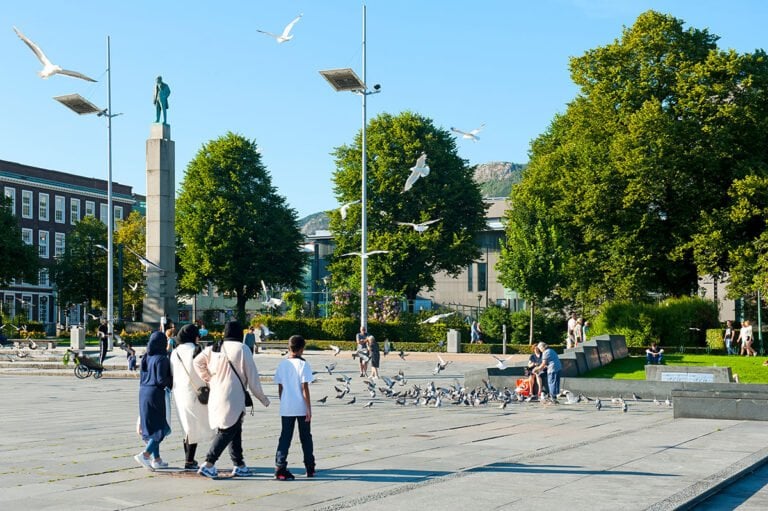Around 40% of immigrants in Norway are working in jobs with lower competency requirements than their education level.
Finding a job in Norway can be a challenge for new arrivals, especially during the process of learning Norwegian. But new data from Statistics Norway suggests the problem doesn't always go away with time.

An overqualified person is someone who has a job in which the competency requirements are lower than the education level of that person. For example, a bus driver with a Master degree in engineering.
Between 2015 and 2021, approximately 14% of Norway's population has been overqualified for their jobs. However, among immigrants, that number was 42%.
The problem was especially notable in the service industry. There are many highly-skilled immigrants working in shops, hotels, restaurants or in driving jobs, none of which require higher education.
Residence length does matter
While the numbers show that things do improve for immigrants over time, it's not the only factor.

Amongst those with a residence period of less than ten years, approximately 54% were considered overqualified. Amongst the group with a longer residence period, the proportion of overqualified was 30%. While better, that's still much higher than non-immigrants.
Skilled immigrants often have trouble
Why is the labour market so difficult to access for skilled immigrants? Life in Norway writer Tone previously addressed this question.
She said that language competence is one barrier, but so is the difficulty of verifying foreign credentials and a perceived lack of cultural understanding.
“Education, experience, and references are not enough; you also need to understand work-place cultural codes, expectations, and how to ‘translate’ and transfer skill sets to a Norwegian context,” she said.

Norwegian companies must change
It could be that companies themselves are the ones who need to adjust, according to a 2021 research study.
It found that companies do not trust the skills of highly educated immigrants. They question their certificates and language skills, and they believe they are less efficient.
“It is normal to be afraid and unsure of the unknown, but it is wise to open up a little. Organisations benefit from having a more diverse workforce,” said professor Annette Risberg of the Inland Norway University of Applied Sciences.
She was one of the study's authors and believes the workforce exists within Europe to meet the needs of many industries with workforce shortages.
Another pointer towards recruiters needed to change their attitude came in an older study. This showed that people with a non-Norwegian name were 25% less likely to be called for a job interview.


This situation is natural and quite obvious. Why even write an article on it? The free job market is the most intelligent system to sort this out. This situation exists in every country where people immigrate. The last thing one wants to do is legislate something here. Free market capitalism solves this in the quickest, most equitable way for all.
With respect, you’re talking rubbish.
A large number of Norwegians I know – and I know plenty – are all off on long-term sick leave because of their ‘mental health’. That, or they’re all leaving the office at 2pm every day after spending all day gossiping and drinking gallons of coffee. Contrasted with the hard work I see from immigrants here in Norway every day (I am one of them), Norwegian companies would actually do better hiring foreigners.
You talk about ‘free market capitalism’, but the free market for educated labour is not working here. Resources are being allocated inefficiently due to Norwegian employers’ xenophobic tendencies.
Consequently, you get a misallocation of capital in paying Norwegians huge salaries to sit at home and cry into their Pepsi Max. Moreover, with so many jobs available – 100k at the last count – it’s obvious many immigrants are shunning Norway in favour of other countries where they can work their way up, rather than serving coffee and cleaning all day. Norway is competing in a global market for jobs, increasingly many immigrants do not want to come here. Stories like the one the article references are ten-a-penny in the foreign labour force: “come to Norway, get treated like dirt, leave”.
I do think this is a societal problem in Norway and not just labour market focussed. I don’t think you want any people from a foreign country here at all haha
Colin, you describe my experience in Norway to a tee. Norwegians need to take a hard look at themselves as my work experience in Norway was one of the biggest disappointments and insults of my working career.
I was brought in to fix a development project after a decade of endeavour and very little too show for all the multi-millions of $ investment. Suffice to say some of the so called brightest minds and highly educated Norwegians onboard did not take to kindly to my introduction.
I can’t agree more with your last sentence ‘Norwegians don’t want foreigner workers in Norway’ – in my case I was vilified for being too driven, focused, loud and falsely claimed to be verbally ‘abusive’. Despite being headhunted, brought in by the international HQ at a very senior level and tasked as a last resort to save the day.
My experience was similar to yours in that the staff that worked late and were prepared to take on board initiatives and improvements were predominantly expats, my apology to the few Norwegians who did try. Yes the mental health card was also played and time off for mundane things was the norm, but all of this in my experience is as a result of a Norwegian mindset which is very socialistic (you are right this is a societal problem) and by this I refer to the government will take care of us mentality, irrespective of our actions or inaction.
As you state the world no longer respects uncompetitive suppliers (countries) and for the time being Norway will be lucky to survive from the income derived from the black drug called oil (and gas), but it comes at a price in the long term as this is not sustainable as Saudi has found out and are now investing to develop others sources of income. My 2 year work and living experience in Norway was unfortunately not what I would wish upon my enemy.
By devious and unethical trumped up deceit I was forced out because I apparently made the Norwegian staff fear me and the heavy handed trade union and the incompetent Norwegian management threw the labor law book at me. Expat versus the might of Norwegian labor law backed by unions etc. was a fight I could not win, therefore had to leave with my tail between my legs.
Unfortunately despite being very culturally aware having worked all over the world should anyone ask me about working and living in Norway I would recommend they make absolutely sure they can live with being shunned and made to feel unwelcome irrespective of their skillset or expertise they have to offer.
It is not a haha for those suffering at the hands of the apartheid practised in Norway.
Thanks for reminding me of my Norwegian nightmare!